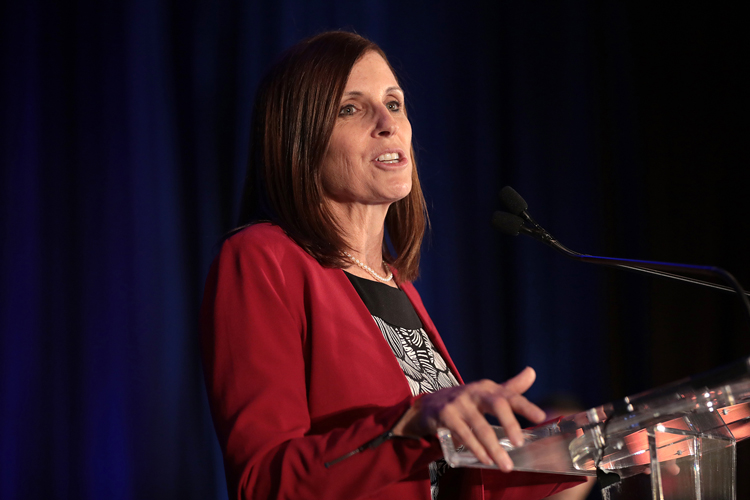Impeachment may have been the business of the day on Capitol Hill Thursday, but Arizona Sen. Martha McSally’s videotaped brush-off of a CNN reporter as a “liberal hack” was the moment of the day.
CNN called McSally’s comment to senior congressional correspondent Manu Raju “unbecoming of a senator.” One media critic said she was “appalled” by McSally’s language and her refusal to answer a reporter’s legitimate question.
But even critics conceded that there was likely some political benefit for the first-term Republican, who faces a tough re-election bid. McSally’s own video of the event had garnered 2.5 million views by Thursday evening, along with a shout-out from President Donald Trump’s campaign that included a link to her campaign donation site.
“I know it is done to endear her to very conservative voters, to the president and to others, but she is a representative of Arizona,” said Margaret Sullivan, a Washington Post columnist covering media.
Sullivan said McSally was deliberately avoiding Raju’s question about Trump’s impeachment trial.
“I think Senator McSally … does not want to answer the question, because there is no good answer from her point of view,” Sullivan said. “How can you legitimately say, ‘We don’t want to hear evidence from any witnesses, we’ve got our minds made up.’”
McSally made the comment as Raju tried to ask her whether new evidence should be allowed in the impeachment trial that officially began Thursday in the Senate. Instead of answering, McSally kept walking briskly down a Senate hallway, saying “Manu, you’re a liberal hack, I’m not talking to you.”
As Raju asked, “You’re not going to comment?” McSally turned in to a hearing room and said again, “You’re a liberal hack, buddy.” Raju tweeted the episode out, saying McSally “lashed out” at him and refused to answer his question.
McSally’s office did not respond to request for comment on the incident – but if she was embarrassed by it, her subsequent actions didn’t show it.
Less than 30 minutes after Raju’s post, McSally responded with a tweet that said “you are” – presumably, a liberal hack – and included her own shaky 10-second video clip of the interaction, which quickly went viral.
Besides the millions of views and the presidential campaign recognition, McSally’s tweet had received more than 37,000 likes and 11,500 retweets by Thursday evening, compared to the close to 50,000 likes and 13,000 retweets for Raju’s original post. McSally’s campaign quickly set up a “liberal hack” website, complete with T-shirts for purchase.
In a statement, CNN called it “extremely unbecoming for a U.S. senator to sink to this level and treat a member of the press this way for simply doing his job.”
Paul Farhi, a media reporter for The Washington Post, said McSally’s snub of Raju was “out of the blue” for a senator.
“They know the game and they know the rules and they know how to interact,” Farhi said. “They also know that there are cameras on them, which leads me to wonder if she knew this was going to be a filmed interaction – it wasn’t spur of the moment, and that she’s kind of using it.”
There was also support for McSally on social media, including a tweet from Rep. Debbie Lesko, R-Peoria, who criticized Raju and called it a “smart move” on the senator’s part.
“The same guy misrepresented what I was saying recently and then it got picked up and repeated by other media,” Lesko said in a tweet.
Arizona House Majority Leader Warren Petersen, R-Gilbert, said he had not seen the video but did not think McSally’s criticism of a “liberal” media was out of bounds.
“I don’t think it’s always been that way, but I think there is definitely a broad consensus or agreement, at least among Republicans that … the majority of the media out there does have a liberal bias right now,” Petersen said.
But Farhi called Raju “a very, very good reporter, very well respected, very fair.” Sullivan said that’s true of most reporters, even if elected officials don’t always like it.
“Straight-ahead reporters at the Washington Post, or at CNN, or at the Arizona Republic or wherever they may be are trying to do the job of representing the public through their questioning,” Sullivan said.
Story by Christopher Scragg and Joshua Gerard Gargiulo, Cronkite News




